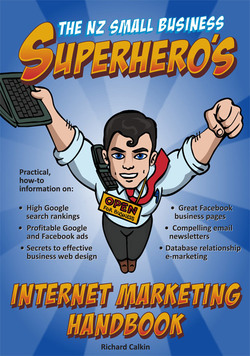Email marketing is about building relationships and encouraging repeat business from your existing customers and contacts, whereas spam involves firing out thousands if not millions of emails to any email address the spammer can get their hands on.
Read the following excerpt from my book ‘The NZ Small Business Superhero’s Marketing Handbook’ to learn how to make sure your email marketing is not considered spam…
Since the passing of the Unsolicited Electronic Message Act in 2007, it is now a legal requirement in New Zealand that recipients of commercial email must have first consented to receive them.
This means you can’t just send a promotional message to any old email address you stumble upon. The good news is that the law is not too onerous, and as long as your database members are legitimate business contacts there shouldn’t be too much to worry about.
The act talks about three forms of consent:
- Express consent. This involves the direct indication of consent from anyone who uses the email address in question. In other words they have clearly stated they are happy to receive commercial emails from you.
- Inferred consent. This is consent inferred from previous business contact, for example, the prospect emailed the business enquiring about products and services.
- Deemed consent. If a recipient’s email address is published without a “no spam” statement and the message is relevant to the recipient’s business then they are “deemed” to have given their consent.
So, if your database members have opted in to your database in the full knowledge that you will be sending them emails, you are covered by express consent. This is the safest method of sign-up and results in the highest quality of members.
As far as offline sign-ups are concerned, this would usually involve a form which includes a clear statement that the completion of the form will result in the person being added to the company’s database. Make sure you file the forms so you can produce them should you receive a spam complaint.
Another possibility would be the collection of a new contact’s business card with a clear verbal explanation that you will add them to your database. In these cases, you should also write on the back of the business card “verbal email permission” and the date, and keep the cards for future reference should you ever receive a spam complaint.
When your website visitors sign up online where it clearly states they are being added to a database and can expect to receive commercial emails, this would also fall into express consent. The best practice in this case is “confirmed opt-in” where an email is sent immediately to the email address signing up confirming that they have joined the database, and offering the chance to unsubscribe if this was not what they intended.
Inferred consent makes it possible for a business to utilise their existing business contacts which may not have expressly provided permission for you to send commercial emails. In other words, if you have had a legitimate business relationship with a contact, this form of consent allows you to send them commercial emails in the future.
Deemed consent is even more liberal. If anyone publishes their email in a public forum (eg on their website or in a publication) and doesn’t include a statement specifically stating that they don’t want to receive unsolicited emails, then as long as the subject of the email is related to their area of business, they have “deemed” to have given consent.
However, while such a practice might not legally be spam, I wouldn’t recommend it because many recipients of an email in this situation would perceive it as spam, and therefore it wouldn’t work as an effective marketing tactic.
Other aspects of the Unsolicited Electronic Message Act that you need to be aware of include:
- All messages must have a “functional unsubscribe facility”.
- Messages must clearly identify the person authorising them and how they can be contacted.
- The use of automatic, online email address harvesting software is explicitly prohibited.
Note that I’m not a lawyer so if you are in doubt about any of this, it may pay to run it by your lawyer first.
To read more, you can purchase my book ‘The NZ Small Business Superhero’s Internet Marketing Handbook’ by clicking here.



